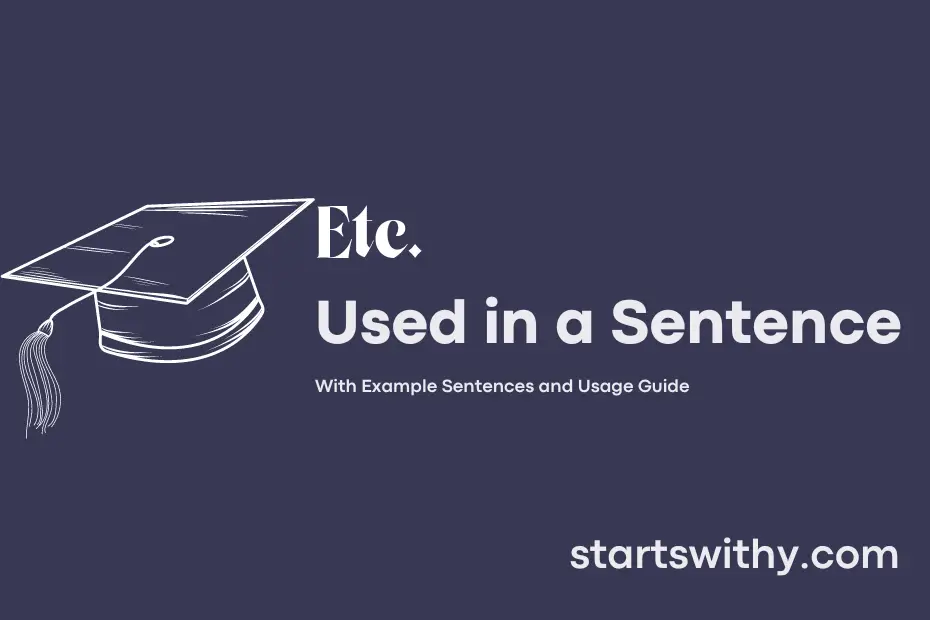Do you often find yourself confused about when to use “etc.” in your writing? “Etc.” is an abbreviation for the Latin phrase “et cetera,” meaning “and so on” or “and other things.” It is commonly used to indicate that there are more items to add to a list but they are not explicitly mentioned.
Knowing when to correctly use “etc.” can enhance the clarity and conciseness of your writing. It is important to understand the appropriate contexts for including “etc.” to avoid ambiguity and ensure that your message is effectively conveyed.
7 Examples Of Etc. Used In a Sentence For Kids
- Dogs, cats, rabbits, etc., are all animals.
- Mangoes, apples, bananas, etc., are all fruits.
- Blue, red, green, etc., are different colors.
- Read books, draw pictures, sing songs, etc., are fun activities.
- Circle, square, triangle, etc., are shapes.
- Monday, Tuesday, Wednesday, etc., are days of the week.
- Summer, winter, monsoon, etc., are seasons.
14 Sentences with Etc. Examples
- Remember to bring your textbooks, notebooks, pens, pencils, etc. for the lecture.
- Make sure to include all necessary references, citations, etc. in your research paper.
- The library offers various resources like books, journals, online databases, etc. for your academic needs.
- Don’t forget about extracurricular activities such as sports, music, dance, etc. during your time at college.
- It’s important to manage your time effectively to balance studying, assignments, projects, social life, etc.
- Always keep track of important dates like deadlines, exam schedules, extracurricular events, etc.
- Attend workshops, seminars, conferences, guest lectures, etc. to enhance your knowledge and skills.
- Utilize campus facilities such as the gym, computer labs, cafeteria, printing services, etc.
- Get involved in student clubs, societies, volunteering opportunities, internships, etc. to broaden your horizons.
- Take advantage of online resources like e-books, educational websites, video lectures, online forums, etc.
- Make use of study groups, peer tutoring, office hours with professors, counseling services, etc.
- Develop important skills like time management, communication, critical thinking, problem-solving, teamwork, etc.
- Consider participating in competitions, hackathons, research projects, workshops, academic conferences, etc.
- Build a strong network with classmates, seniors, alumni, industry professionals, mentors, etc.
How To Use Etc. in Sentences?
Etc. stands for “et cetera,” which means “and so forth” or “and other similar things.” It is used to indicate that there are more examples or options that could be included but are not explicitly mentioned.
When using Etc. in a sentence, it is important to follow it with a comma to separate it from the rest of the sentence. For example, “I need to buy groceries like milk, eggs, bread, etc., for the party.”
You can use Etc. at the end of a list to show that there are additional items that are not listed. It helps to avoid listing every single item when the audience is already familiar with the idea that there are more options.
Remember that Etc. should only be used in informal and conversational writing, such as emails, texts, and casual documents. In formal writing, it is best to avoid using Etc. and instead list out all the examples or options.
In conclusion, Etc. is a useful abbreviation for indicating that there are more examples or options that could be included but are not explicitly mentioned. Just remember to use it with a comma and only in informal writing contexts.
Conclusion
In writing, sentences that use “etc.” serve to suggest that there are additional examples or possibilities beyond what has been explicitly mentioned. These sentences are especially useful for conveying a sense of inclusivity and completeness without having to list every single item or detail. By using “etc.,” writers can keep their statements concise and efficient, making it easier for readers to grasp the overall message.
Overall, sentences with “etc.” help streamline communication by indicating that other similar items or ideas could be added without repeating the same information. By employing this abbreviation effectively, writers can provide a sense of openness and extension to their statements, inviting readers to consider a broader range of examples or scenarios beyond those explicitly provided.



